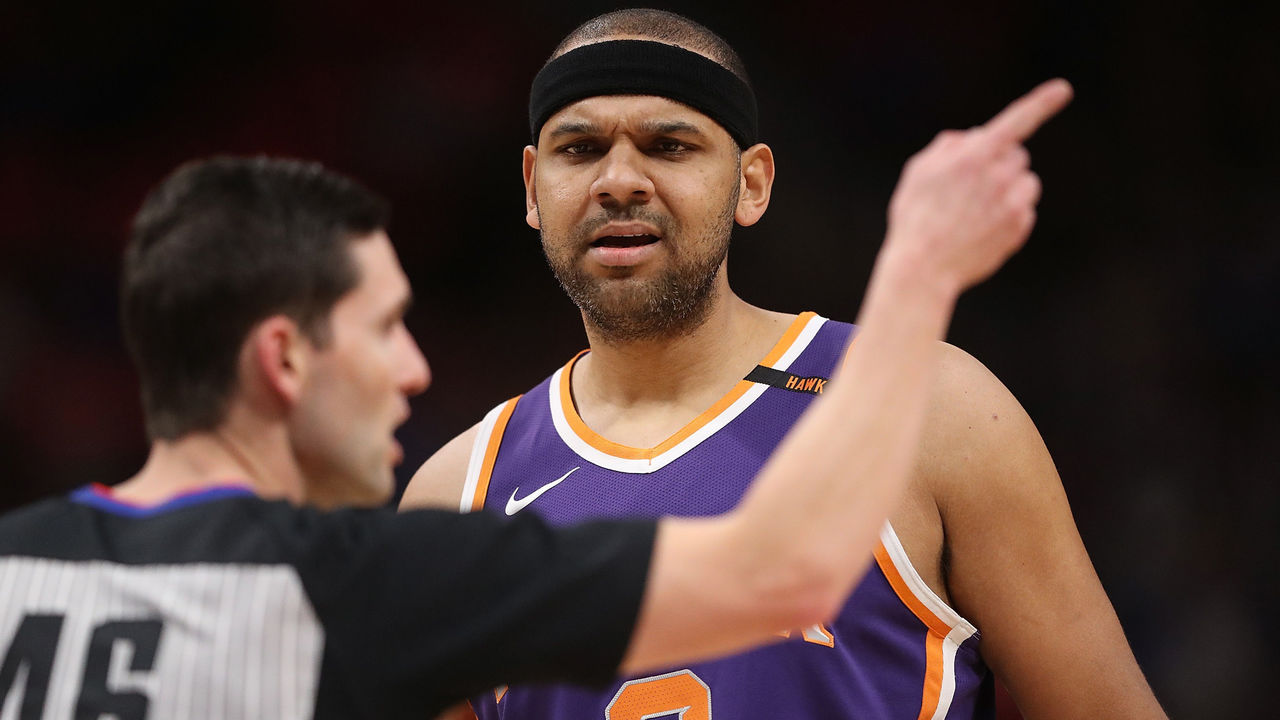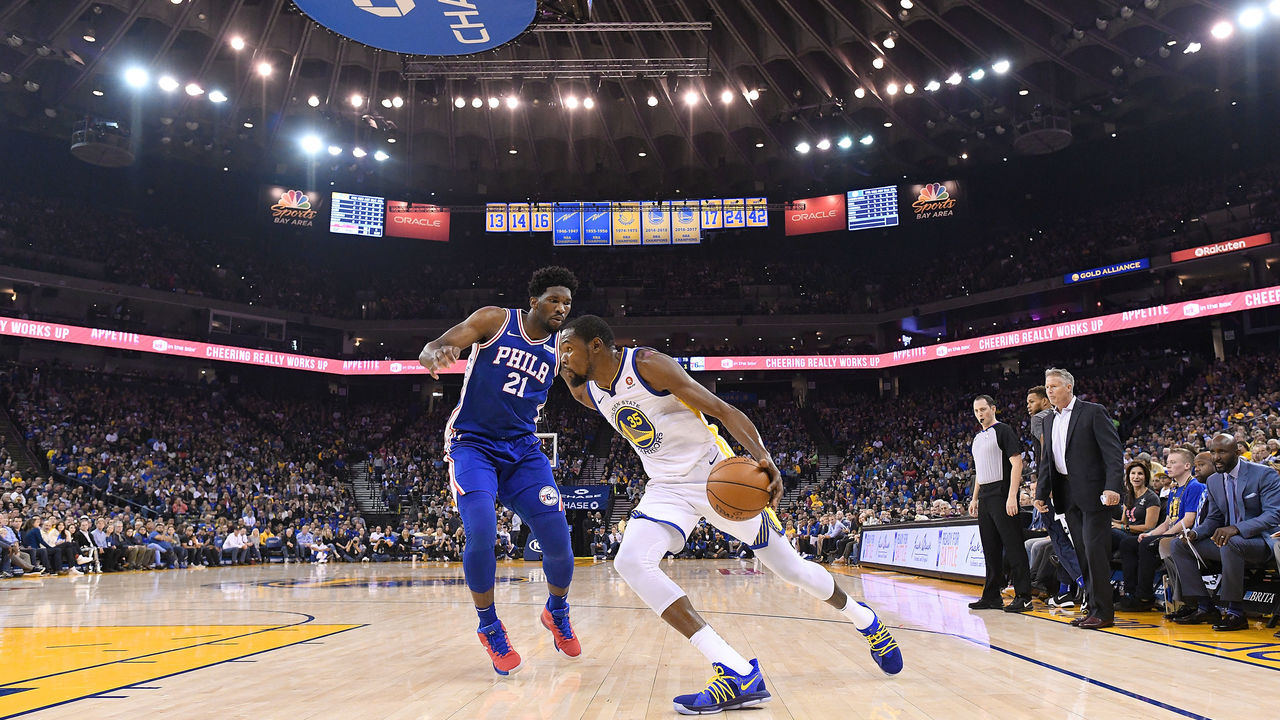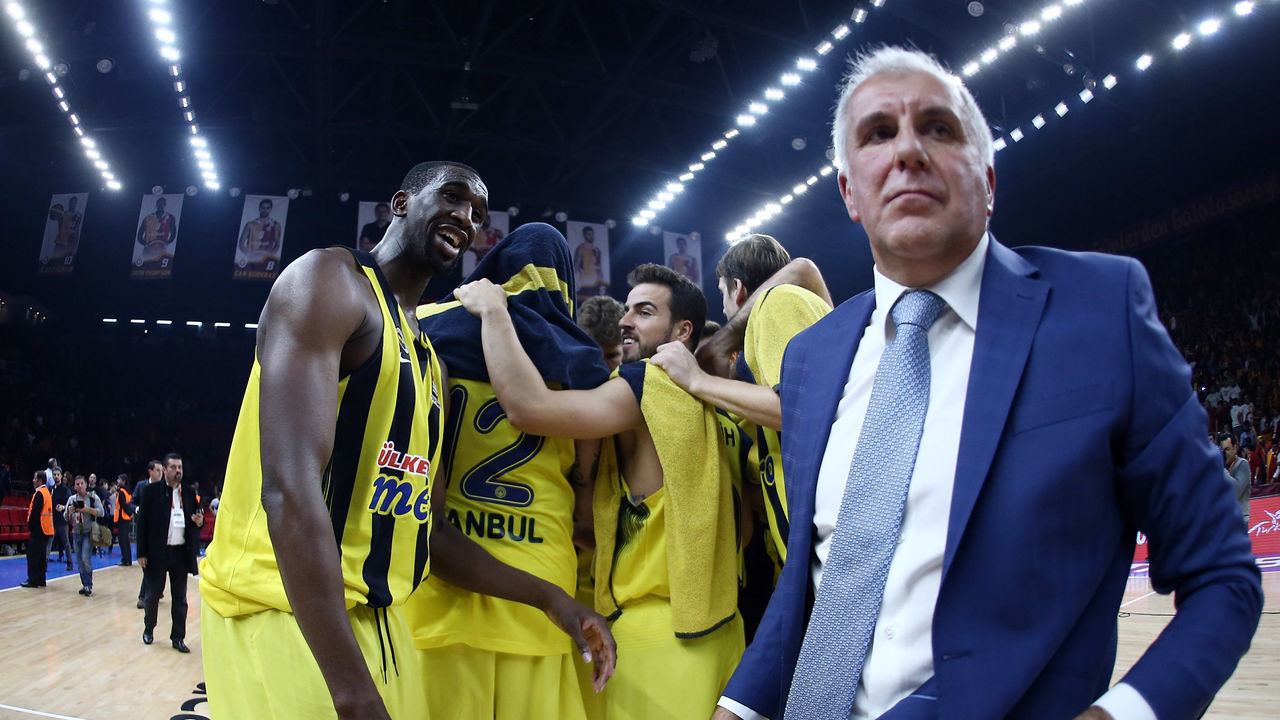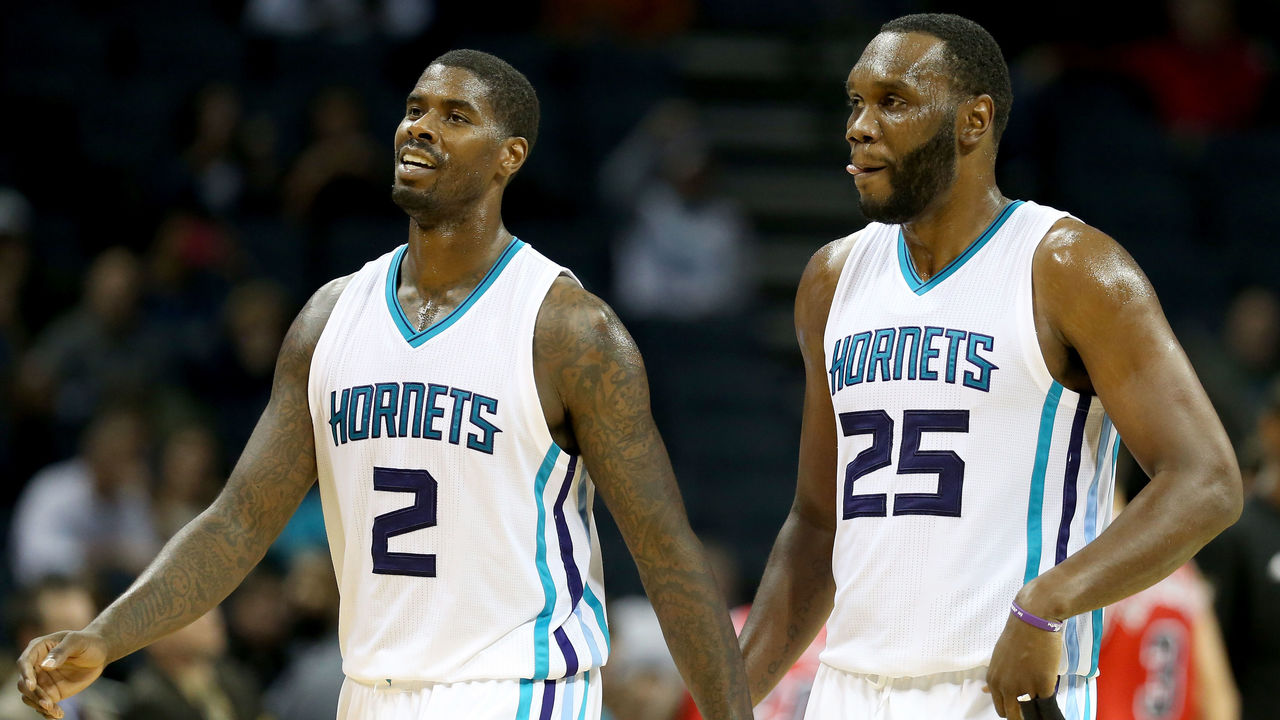Twitter blocks and trash talk: On NBA players' love-hate relationship with social media
Warning: Story contains coarse language.
After a poor shooting performance earlier this season, Portland Trail Blazers swingman Evan Turner was checking his phone in the locker room when he came across a direct message on Twitter from a fan, who told him to "get off the rock and stop trying to be Michael Jordan."
“I just blocked him,” Turner told theScore. “Like if this dude said that, I can only imagine how far behind he is in life just off his awareness alone.”
Whether it’s connecting with fans, or using it as a news source, social media has become essential for the majority of athletes - but many of them are frustrated at having to deal with a barrage of negative comments online.
NBA players' performances are open to scrutiny. A shooting slump often leads to vocal fan frustration. If players underperform after signing a huge contract, trolls online will be quick to remind them. Sometimes, personal lines are crossed. You only need to browse the Twitter mentions of virtually any player’s tweet to see how inappropriate the comments can get.
“People who shouldn’t have voices have voices,” Toronto Raptors veteran C.J. Miles said. “We have a bunch of people who don’t know anything getting to scream on the soapbox, and the soapbox is the size of the Empire State Building because everyone sees it.
"You have people running around that are literally demoralizing people and trying their hardest to kill people’s souls and dreams for no reason. It’s part of who we have become as people. We seek that type of attention and energy because we’re so used to it being around. There are no consequences. That’s why kids get grounded and suspended from school when they do something wrong. There’s none of that online. If you get blocked online, you can just create another page.”
__________

In a perfect world, social media would be a place for players to share their opinions and facilitate intelligent conversations.
“It’s a great tool to interact with your fans,” Memphis Grizzlies center Marc Gasol said. “To tell people how you feel and to put out news about yourself.”
Gasol, who has nearly 1.25 million Twitter followers, posts fairly innocuous tweets the majority of the time - but even he isn't immune from the occasional troll, even when tweeting about his Netflix binge of choice:
Nice game last night 6 rebounds for a seven footer garbage tire gasol keep fizdale
— John Walton (@waltoj11) November 30, 2017
That said, social media can be a useful tool for athletes who can now build a brand like never before. Consider Phoenix Suns forward Jared Dudley, a role player who wouldn't have garnered much attention from fans 20 years ago.
Dudley joined Twitter shortly after seeing teammate Shaquille O’Neal tweeting at halftime of a game. Dudley, who now has more than 212,000 followers, started interacting with fans, giving away tickets, and providing an insider look at player’s houses and what day-to-day NBA life was like.
“My whole thing was to put a personality with a face,” Dudley said. “I’m honest and genuine. I might say some controversial things, but it’s always something I’ve thought through. I give my opinions, and even if I’m not right, I have the facts to back it up and it’s something I believe in.”
__________

After a win over the Philadelphia 76ers earlier this year, Golden State Warriors superstar Kevin Durant said, “We didn’t want to lose to those guys. Especially Joel Embiid. He would’ve went straight to Twitter and talked shit.”
Despite the defeat, Embiid went on Twitter anyhow, posting a photo of Draymond Green and writing: “Now we know what it feels like to blow a big lead,” a reference to the Warriors losing the 2016 Finals after being up 3-1 on the Cleveland Cavaliers.
“There’s a way to do it and there’s a way not to do it,” Miles said. “You can tell when guys are joking and having fun. (Embiid) is not talking about beating people up. It’s funny. Nobody is upset about that stuff.”
Increasingly, social media has become a place for back-and-forth between players. Dudley and New York Knicks center Enes Kanter recently engaged in a postgame war of words on Twitter. Many players expressed displeasure over All-Star snubs with cryptic tweets and Instagram posts. Whenever Kyrie Irving clicks "like" on Instagram on a highlight video about LeBron James, it's seen as a slight.
Sometimes, teammates have to clear the air about their social media activity. John Wall and Marcin Gortat of the Washington Wizards met privately earlier this month to clear the air about a tweet Gortat sent. Last season, Phil Jackson’s relationship with Carmelo Anthony deteriorated after Jackson made disparaging remarks about the then-Knicks star on Twitter.
James Johnson has no issues with fellow players talking trash online. The Miami Heat forward believes it helps foster rivalries, which the league is lacking today.
“They talk trash, you talk trash back, then you have to play them,” Johnson said. “You get to shut them up with your basketball game."
Asked if any player has ever trolled him online, Johnson smiled and said, “Never. But I wish.”
Turner has a different perspective.
“I personally wouldn’t do it,” he said. “At the end of the day, you’re going to run into that person. I just feel like it’s corny as hell. When you don’t see people, they be talking mad cash money shit, and when you see them, nothing happens. If I’m not your friend and we don’t like each other, I just stay away from you.”
Maybe Russell Westbrook put it best at All-Star weekend when he said: “This is not real trash talk. Real trash talk was back in the 80s and 90s. Now it’s just so you guys can laugh, make memes, and all type of nonsense.”
__________

Players and coaches still remember what it was like before the social media era. Turner used to own a Motorola Razr, and didn’t always have the internet on his phone because it was too expensive.
“You were always waiting for that one text,” Turner said. “But there weren’t a lot of apps. I definitely wasn’t glued to it.”
Before he could stream everything on his phone, Miles had to carry DVDs around on the road to catch up on his favorite shows.
“They were smartphones,” Miles said, “but they weren’t genius phones.”
Raptors head coach Dwane Casey, who started in the NBA as an assistant coach in 1994 with the Seattle Supersonics, recalls bus rides where players would communicate and talk to each other. Now, everyone is busy texting.
“It’s a new age. It’s a new millenium,” Casey said “I used to walk in the locker room, and Sam Perkins would be sitting there reading the newspaper.”
Many players agree the simple art of communicating and having face-to-face conversations with teammates has been lost.
Self-discipline is one way of restoring some order in the smartphone era. Turner turns off his Twitter notifications whenever he feels overwhelmed. Gasol doesn’t even have the Twitter app on his phone. He also follows a few unwritten rules: always put the phone away when you're mad or frustrated, and always leave the phone on the counter when spending time with family.
If players can’t police themselves with their phone use, sometimes a coach will have to step in. Utah Jazz center Ekpe Udoh played for head coach Zeljko Obradovic (shown above) for two seasons in Turkey.
“We weren’t allowed to use our phones during breakfast, lunch, or dinner,” Udoh said. “Unless it was a big win.”
More and more, Udoh started interacting with his teammates, getting to know them and being part of larger conversations about things beyond basketball.
__________

And then, there are players who have chosen to stay off social media entirely.
During a road trip to Milwaukee with the Atlanta Hawks, Marvin Williams, along with teammates Jeff Teague and Jordan Crawford, were stuck in the hotel for three days due to bad weather. Out of boredom, Teague decided to help Williams create a Facebook account.
“I had to keep calling him to get the password,” said Williams, now with the Charlotte Hornets. “I just couldn’t remember it. It lasted two and a half days and I just told him to delete it.”
Williams has a simple explanation about why he isn’t on social media: people that need to talk to him have his number and know how to reach him.
“That’s how I like it,” Williams said. “I’m just a private guy. Social media exposes you to the good, bad, and the ugly, and I have no interest in any of that.”
Indiana Pacers big man Al Jefferson - Williams' former teammate with the Hornets - simply cites his age for why he’s not on social media.
“That’s not my cup of tea,” Jefferson said. “I’m not one of them types that wants to get on social media. That’s for the young boys.”
Although Embiid is arguably the best at using Twitter among NBA players, two teammates would prefer not to be on social media too much. Months before he had to go on social media to respond to a controversy in which he uttered a racial slur by accident in a Chinese New Year video, JJ Redick expressed his desire to stay offline.
“Whether you’re receiving the dopamine hit from good comments or you’re getting that anxiety from negative comments,” Redick said, “there’s really no good that comes of it.”
T.J. McConnell has removed himself from Twitter entirely. The only content that's been posted this season on his account has come from his management team.
“When I was on (Twitter), I went looking for the wrong things,” McConnell said. “It made me stress and made it difficult to concentrate.”
But what about the fear of missing out on all the great content that Embiid is generating on Twitter after games?
“I see them on Sportscenter anyways,” McConnell said.
Alex Wong is an NBA freelance writer whose work has appeared in GQ, The New Yorker, Sports on Earth, and Complex, among other publications.
(Photos courtesy: Getty Images)
HEADLINES
- Spurs erase 15-point deficit vs. Raptors for 10th straight win
- Duren, Cunningham lead Pistons past shorthanded Thunder
- Suns' Ishbia offering $1M to 2027 Slam Dunk, 3-Point Contest winners
- Harden misses loss to Bucks after being diagnosed with thumb fracture
- Report: Jazz's Markkanen suffers ankle, hip injuries in practice